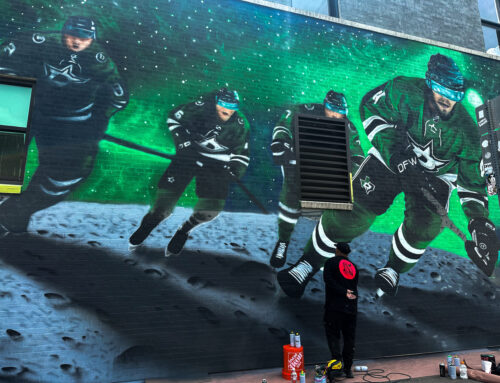When Burton “Bubba” Gilliam answered the phone at Fire Station 39 on Shiloh Road in Casa View, he didn’t doubt that the person on the other end was Mel Brooks. His dilemma was that he didn’t know who Mel Brooks was. Gilliam was a 14-year Dallas fire fighter who had stumbled into a role in “Paper Moon” after answering a newspaper ad looking for movie extras. He had taken his vacation time, gone on location in Missouri, and had enjoyed his film career as Floyd the desk clerk in the Depression-era comedy starring Ryan and Tatum O’Neal. Now it was time to get back to work, to his pension, and to his family.
But now, three months later, this guy on the phone kept insisting he was a well-known movie director who wanted to give Gilliam a part in his new picture. It was a big part too, said the director, much bigger than the five scenes Gilliam had in “Paper Moon.”
“After he finally convinced me who he was, I told him I wasn’t interested.” says Gilliam, who graduated from Woodrow Wilson in 1956 and would ride his bike to White Rock Lake to go swimming when he was a kid. “I told him I had used up my vacation time, and I couldn’t quit the fire department to go be in some movie.”
When Gilliam tells this story, he is smiling. How many people — let alone firemen — turn down Mel Brooks on the telephone, sight unseen? He is also smiling because he knows that it’s not the end of the story. It’s actually the beginning.
Burton Gilliam didn’t become one of the biggest stars in Hollywood after telling Mel Brooks ‘no,’ but he did become one of the few successful actors who started his career by telling Mel Brooks ‘no’.
If someone needed an eccentric cowboy or good old boy in the past 25 years, chances are they called Gilliam. He played Slim Pickens’ sidekick, Lyle, in Brooks’ “Blazing Saddles,” where he showed Cleavon Little how to sing Negro spirituals. He was the head Flyin’ Elvis in “Honeymoon in Vegas,” among his dozens of movie roles. He has appeared in more than 100 TV shows, and was on “Evening Shade” with Burt Reynolds for three seasons. And he may be best known as the national spokesman for Pace Foods, the wrangler who is always shocked to learn that someone has given him picante sauce made in New York City.
“I never thought about being an actor until I was one,” says Gilliam. “I still think of myself as a fireman. This has been a fairy tale.”
This day, Gilliam is at Lakewood Country Club. He is playing host to golf tournaments at the Lakewood and Tenison golf courses this month that are part of LakeFest ’99, a year-long fundraiser to help renovate and restore White Rock Lake. This means there are people to talk to, photos to be shot, and publicity to be taken care of. He is delighted to be there, and not even the mid-90s heat and the necessity of taking pictures on the course in the late afternoon sun seems to dismay him.
“Burton was just a natural for this,” says Barbara Adamson, who chairs LakeFest 2000 and has known Gilliam since they were classmates at Woodrow in the early 1950s. “He loves the lake, he’s a community activist, and now he is back home, so he can help. As soon as I thought about holding a tournament, I called him. He said he would be happy to help, and I told him he was going to be the host.”
This sort of activity is nothing new to Gilliam. He is well-known on the charity golf circuit, host to a tournament for 13 years in the Los Angeles area. And though he doesn’t mention it, he played a key role in setting up a major Phoenix tournament that benefits abused children called Cowboys for Kids.
Says his Los Angeles-based agent, Steven Stevens: “I don’t know if he has ever told anyone ‘no’ when it comes to helping out kids.”
Besides, Gilliam and White Rock Lake go back a long way. “I love the lake,” he says. “I’d love to see it be used the way it used to be, when I was a kid. In the summer then, it was the greatest place. You had to hunt for a place to have a picnic, because they were so many people out there. It could be used a lot more than it is.”
In that respect, Gilliam’s memories are ones shared by thousands of other neighborhood residents. He remembers the paddle boats, and the retired fireman who rented them. He remembers renting swimming suits for 15 cents at the bath house — men’s and women’s — and paying a dime to get in to the pool. He remembers the descent into the old locker room, entering under the spray of water, and emerging onto the sandy beach. He remembers the complex and amazing sand sculptures that used to dot the shore.
“When I was eight, my brother Gene and I used to ride our bikes from McKinney Avenue, where we lived, to the lake,” he says. “First, we would stop and see my dad, who was at Fire Station 19 at Beacon and East Grand. Then we would ride to the lake. The whole trip was about 3 1/2 miles, but we didn’t think anything of it. We just liked to go to the lake so much.”
Gilliam moved back to the Dallas area three years ago because he wanted to be closer to his family and old friends. His daughter and four grandchildren live in Lake Highlands, and he has always kept in touch with old friends like Adamson. In fact, he has rarely missed a Woodrow reunion since his class started having them.
He is also a long time boxing referee whose friends include the Spider Bynum, a legend in Dallas-area boxing circles. Gilliam boxed when he was at Woodrow, and holds the record for accumulating the most Golden Gloves titles in the youth event’s history.
But all this doesn’t mean he is retiring. He will play one of the good guys in a “Walker, Texas Ranger” set to air in November, he still makes appearances for Pace, and he has put together a local cable talk show that he wants to try and take to the next level.
“It is different interviewing people,” he says. “For years, I was the one who was being interviewed. Now I am the one asking questions.”
And then there are the stories. He says he only has one, but once he starts talking, that one story turns into a dozen. He credits a casting director named Gary Chasen — “It’s spelled C-H-A-S-E-N,” he says without being asked — with his first break. Chasen told Gilliam he might have something bigger for him in “Paper Moon,” and recommended him to director Peter Bogdanovich. When Gilliam read for Bogdanovich a couple of weeks later, Cybill Shepherd (then the director’s girlfriend) was feeding Bogdanovich grapes during the audition. When Gilliam was done, she jumped up and said, “Oh honey, hire him, he’s so cute.”
He turned Brooks down three times before taking the role that cemented his acting career. That included a couple of trips to Los Angeles, where he met Brooks and Richard Pryor, who collaborated on the script for “Blazing Saddles” (and who later made one of those firehouse calls). The reason was money. Gilliam was making $20,000 as a year as a fireman, and told Brooks he couldn’t quit his job unless he made that much for his month’s work in the movie.
“That shows what ignorance can do for you,” he says with a laugh.
His family was disappointed with him for leaving the fire department. So were his bosses in Dallas, who spent a considerable amount of time trying to talk him out of leaving for something as insecure as acting. To this day, he is the only member of his family who ever left the fire department., and they still remind him of it.
No one, while they were making it, was quite sure if “Blazing Saddles” was going to be a
ny good. Rumors that the studio was going to shut down production were rampant, and more than once, Gilliam saw black limos deposit studio execs in coats and ties onto the set in the Southern California desert.
“But you know what?” says Gilliam. “Mel Brooks knew what we were doing, and that was enough. I will never, ever forget ‘Blazing Saddles’. It was my best movie experience.”
His three years as barbecue guru Virgil Mosely on “Evening Shade” weren’t all that fulfilling as an actor. “I didn’t have anything to do,” he says. “All I ever had were five lines a show, something like ‘I’ll go get the horses’.” But he did get to work with Burt Reynolds (“A great guy — totally misunderstood, and someone who I’m glad is a good friend of mine”), Charles Durning, and Hal Holbrook.
“Bubba is just a natural,” says Stevens, whose clients include Star Trek’s James Doohan, and who has represented western stars like Slim Pickens, Chuck Connors and Amanda Blake. “He’s the kind of person I like to represent. For some reason, boxers seem to take to acting, at least the ones I’ve known. They have a good sense of humor. Where the fireman part fits in, I can’t quite figure out.”
Actually, one part of Gilliam’s real life experience did pay off. He had trouble learning lines until he remembered a trick he had used to memorize street directions, intersections and addresses as a fireman. He would write down what he was supposed to memorize and, somehow, that repetition made it easier to remember the streets — and later his lines.
And just to show how well it works, he starts reciting the directions and streets around Shiloh Road.
One question everyone asks Gilliam is how they can become an actor. “The first thing I tell them,” he says with another smile, “is that they can do what I did — become a fireman first. That’s the easy way.”
But the best advice, Gilliam says, is to act. And then act some more. And then act even more than that. He is a strong advocate of repertory theater, where actors not only play different roles but sometimes double as stagehands, painters, and the like.
“You’ve got to learn your craft,” he says. “And there is more to that than just reading lines.”
The other key point to remember is that most people who want to act never do. They don’t become stars, or even successful character actors. Their chances of success are so small — and here he holds his thumb and first finger so close together there is almost no space between them — that it’s a good idea to learn how to do something else, just in case.
“That’s why I never tell anyone to be a theater major,” he says. “What are you going to do with that if you have to get a job?”
After all, not everyone can be a fireman first.





